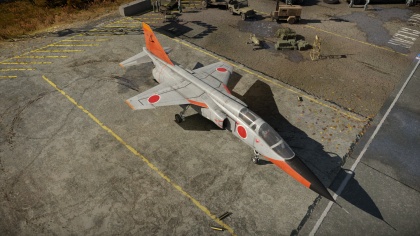Difference between revisions of "T-2"
(→Flight Performance) (Tag: Visual edit) |
Inceptor57 (talk | contribs) m |
||
| Line 9: | Line 9: | ||
== General info == | == General info == | ||
=== Flight Performance === | === Flight Performance === | ||
| − | ''Describe how the aircraft behaves in the air. Speed, manoeuvrability, acceleration and allowable loads - these are the most important characteristics of the vehicle. This jet, according to update 1.87, Is the fastest jet. The manoeuvrability isn't a strength. The acceleration is comparable to the MIG-19, it is excellent but may not be the best at very low speeds. It has two AIM-9E for dogfights and some rocket and bomb loads. The 20mm Gatling cannon does take a learning curve to get use to because of a short .25 second spool time. This jet comes with radar assisted aiming. | + | <!--''Describe how the aircraft behaves in the air. Speed, manoeuvrability, acceleration and allowable loads - these are the most important characteristics of the vehicle.''--> |
| + | This jet, according to update 1.87, Is the fastest jet. The manoeuvrability isn't a strength. The acceleration is comparable to the MIG-19, it is excellent but may not be the best at very low speeds. It has two AIM-9E for dogfights and some rocket and bomb loads. The 20mm Gatling cannon does take a learning curve to get use to because of a short .25 second spool time. This jet comes with radar assisted aiming. | ||
=== Survivability and armour === | === Survivability and armour === | ||
Revision as of 16:09, 29 March 2019
Contents
Description
The Mitsubishi T-2 is a rank VI Japanese jet fighter
with a battle rating of 10.0 (AB) and 9.7 (RB/SB). It was introduced in Update 1.87 "Locked On".
General info
Flight Performance
This jet, according to update 1.87, Is the fastest jet. The manoeuvrability isn't a strength. The acceleration is comparable to the MIG-19, it is excellent but may not be the best at very low speeds. It has two AIM-9E for dogfights and some rocket and bomb loads. The 20mm Gatling cannon does take a learning curve to get use to because of a short .25 second spool time. This jet comes with radar assisted aiming.
Survivability and armour
Examine the survivability of the aircraft. Note how vulnerable the structure is and how secure the pilot is, whether the fuel tanks are armoured, etc. Describe the armour, if there is any, and also mention the vulnerability of other critical aircraft systems.
Armaments
Offensive armament
Describe the offensive armament of the aircraft, if any. Describe how effective the cannons and machine guns are in a battle, and also what belts or drums are better to use. If there is no offensive weaponry, delete this subsection.
Suspended armament
Describe the aircraft's suspended armament: additional cannons under the wings, bombs, rockets and torpedoes. This section is especially important for bombers and attackers. If there is no suspended weaponry remove this subsection.
Defensive armament
Defensive armament with turret machine guns or cannons, crewed by gunners. Examine the number of gunners and what belts or drums are better to use. If defensive weaponry is not available, remove this subsection.
Usage in battles
Describe the tactics of playing in an aircraft, the features of using vehicles in a team and advice on tactics. Refrain from creating a "guide" - do not impose a single point of view, but instead, give the reader food for thought. Examine the most dangerous enemies and give recommendations on fighting them. If necessary, note the specifics of the game in different modes (AB, RB, SB).
Pros and cons
Summarize and briefly evaluate the vehicle in terms of its characteristics and combat effectiveness. Mark its pros and cons in the bulleted list. Try not to use more than 6 points for each of the characteristics. Avoid using certain definitions such as "bad", "good" and the like - use substitutions with softer forms such as "inadequate" and "effective".
Pros:
Cons:
History
Describe the history of the creation and combat usage of the aircraft in more detail than in the introduction. If the historical reference turns out to be too big, take it to a separate article, taking a link to the article about the vehicle and adding a block "/ History" (example: https://wiki.warthunder.com/(Vehicle-name)/History) and add a link to it here using the main template. Be sure to reference text and sources by using <ref>, as well as adding them at the end of the article. This section may also include the vehicle's dev blog entry (if applicable) and the in-game encyclopedia description (under === Encyclopedia Info ===, also if applicable).
Media
Excellent additions to the article would be video guides, screenshots from the game, and photos.
See also
Links to the articles on the War Thunder Wiki that you think will be useful for the reader, for example:
- reference to the series of the aircraft;
- links to approximate analogues of other nations and research trees.
External links
Paste links to sources and external resources, such as:
- topic on the official game forum;
- encyclopedia page on the aircraft;
- other literature.
| Japan jet aircraft | |
|---|---|
| IJNAS | |
| Experimental | Kikka |
| Reconnaissance | R2Y2 Kai V1 · R2Y2 Kai V2 · R2Y2 Kai V3 |
| IJAAS | |
| Fighters | Ki-200 |
| JASDF | |
| Fighters | F-86F-30 ▅ · F-86F-40 ▅ · F-86F-40 JASDF▅ |
| F-104J | |
| F-4EJ Phantom II · F-4EJ ADTW · F-4EJ Kai Phantom II | |
| F-15J · F-15J(M) | |
| F-16AJ | |
| F-1 | |
| Trainers | T-2 Early · T-2 |
| Foreign | |
| Thailand | ▄AV-8S · ▄F-5E FCU |





